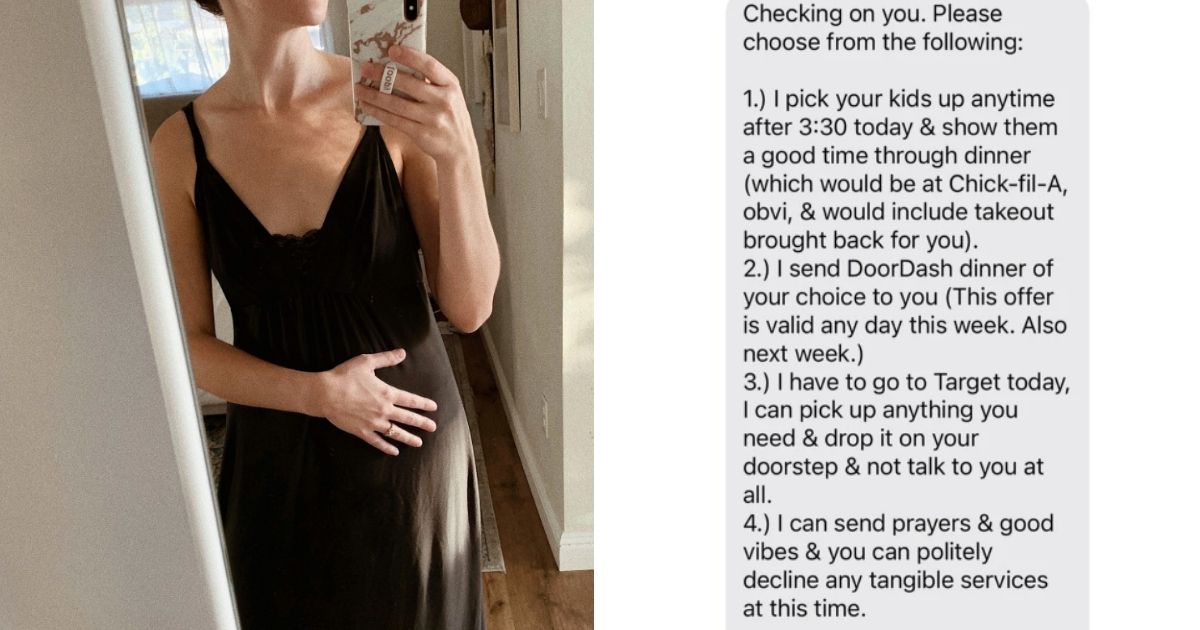When someone else experiences a tragedy, even the most well-meaning friends can be at a loss for what to say. That uncertainty increases if those friends haven’t experienced the same type of loss as the person they’re trying to comfort. So many times, either the wrong thing is said or nothing is said at all.
But two women are helping give people a way forward in such situations, sharing their own experiences as an example.
Ashlee Gadd, 35, shared her story on Oct. 15, World Pregnancy and Infant Loss Remembrance Day. She posted on Coffee + Crumbs, an online community that she started.
“I barely remember what the doctor said,” her post began. “Something about the baby not developing, being too small for seven weeks. I’d need to come back to confirm, then schedule a D&C. I float out of my body for a second, as if I’m watching someone else be told they are having a miscarriage.”
She explained in heartbreaking detail how she processed the news.
[firefly_embed]
[/firefly_embed]
“It was enough time to wrap my head around the inevitable purchase of a minivan. Enough time to make plans to take a friend’s hand-me-down carseat. Enough time to download one of those apps that tells you the baby is the size of a blueberry.
“It was enough time to stop wearing jeans, to start slathering my body in cocoa butter again. It was enough time to joke about the baby coming out orange … because all I’ve been able to stomach are Cheeze-it’s.
“Seven weeks. It was enough time to fall in love.”
Gadd told “Today” that the miscarriage hit her very differently than she imagined it would.
“There’s so much I didn’t know about this kind of loss,” she said. “I never understood how much ordinary life continues swirling around… how this process doesn’t happen in a day. It lasts and lingers. I never considered how many women are walking around in public places in the process of silently miscarrying.”
Thankfully, Anna Quinlan, Gadd’s friend of 10 years, knew how to come alongside and support her friend.
Many people who reach out to help their grieving friends ask open-ended questions that place the burden of responding on the grieving party. As well-meant as the questions may be, asking “how are you?” or saying, “if there’s anything I can do, let me know” puts all the responsibility on the person being asked.
[firefly_embed]
[/firefly_embed]
So Quinlan selected a few concrete options, stated them in no uncertain terms and sent them to Gadd.
“Checking on you,” her text message began. “Please choose from the following.”
“1. I pick your kids up anytime after 3:30 today & show them a good time through dinner (which would be at Chick-fil-A, obvi, & would include takeout brought back for you).
“2. I send DoorDash dinner of your choice to you (This offer is valid any day this week. Also next week.)
“3. I have to go to Target today, I can pick up anything you need & drop it on your doorstep & not talk to you at all.
“4. I can send prayers & good vibes & you can politely decline any tangible services at this time.”
It just so happened that Gadd was on her last roll of toilet paper and needed some more Cheez-Its, so she gratefully selected option 3 and Quinlan got them to her that afternoon.
Quinlan’s offer was a breath of fresh air for Gadd, and she deeply appreciated the way her friend had reached out.
“More often than not, I think most of us default to, ‘Let me know if you need anything’,” Gadd said. “I’ll speak for myself — I’ve sent that text a hundred times. She gave me something tangible to grab onto, without the emotional fatigue of trying to think of what I needed.”
Quinlan said the method has come out of experience, necessity and knowing her strengths.
“I’ve seen so many of my friends endure really hard times… husbands and children with cancer, miscarriages, divorce, sudden deaths of parents,” she said. “I am always amazed at the crowd of women I see gather around to offer support in those times.
“I know that Ashlee has other friends who can offer totally different resources, like sharing their own vulnerable stories of miscarriage or offering beautiful flowers or gifts. I’m not as great at those resources, but I can drop toilet paper and crackers on your porch by 3 p.m.”
The next time you reach out to someone who’s in a tough situation, consider taking a page from Quinlan’s book and you may have more people taking you up on your offer.
This article appeared originally on The Western Journal.
























